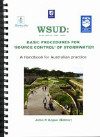WSUD: Basic Procedures for 'Source Control' of Stormwater

Australian WSUD Handbook
John Argue
“Water-sensitive Urban Design” (WSUD) is a term used in Australia to describe sustainable water cycle management in the urban landscape. To assist practitioners in designing rainwater source control measures, A Handbook for Australian Practice was published in 2005. The Handbook is a compilation of proven approaches that are aimed at solving everyday problems of small-scale rainwater management.
Stormwater Source Controls Design Guidelines 2005 – Final Report

Rain Garden
GVRD
To complement the Water Balance Model, the Stormwater Inter-Agency Group (SILG) – a technical committee of the Greater Vancouver Regional District (GVRD) – commissioned a research project to create “Stormwater Source Controls Design Guidelines 2005”. This work is based on the adaptation of design standards from areas of Europe and North America with similar climatic and soil conditions. The objective of this project is to reduce information barriers that stand in the way of effective implementation of rainwater source controls in the Georgia Basin region of British Columbia.
Stormwater Planning: A Guidebook for British Columbia

Integrated Strategy
KAS
Founded on British Columbia case study experience, and published by the BC Ministry of Water, Land and Air Protection in 2002, Stormwater Planning: A Guidebook for British Columbia formalized a science-based understanding to set performance targets for reducing rainwater runoff volumes and rates. These targets represent the synthesis of biological and hydrological understanding. The Guidebook is structured to meet the information needs of different audiences.
Template for Integrated Stormwater Management Planning 2005

Integrated Rainwater Mgmt Planning
In British Columbia, the term Integrated Stormwater Management Planning (ISMP) has gained widespread acceptance by local governments and the environmental agencies to describe a comprehensive, ecosystem-based approach to rainwater management. In the Greater Vancouver region, one of the primary results of a co-ordinated approach has been the creation of a template for ISMPs, which are watershed- specific, flexible and adaptive strategies.
Metro Vancouver Develops Design Guidelines to Complement Water Balance Model
The Greater Vancouver Regional District (GVRD) – commissioned a research project to create “Stormwater Source Controls Design Guidelines 2005”. The objective of this project was to promote effective implementation of rainwater source controls in the Georgia Basin region of British Columbia.
Greater Vancouver Region Develops Design Guidelines for Infiltration Swale Systems
In British Columbia, the technical language is being simplified. Six simplified categories have been defined, one of which is Infiltration Swale Systems.
Greater Vancouver Region Develops Design Guidelines for Rain Gardens
In British Columbia, the technical language is being simplified. Six categories have been defined, one of which is Rain Gardens.
Rainwater Management in British Columbia: Performance Target Methodology at heart of Provincial Guidebook

“The widespread changes in thinking about rainwater runoff impacts that began in the late 1990s reflected new insights in two areas: hydrology; and aquatic ecology. These new insights were the result of improved understanding of the causes-and-effects of changes in hydrology brought about by urban development, and the consequences for aquatic ecology,” explains Peter Law.
Greater Vancouver Region Develops Design Guidelines for Absorbent Landscapes
In British Columbia, the technical language is being simplified. Six simplified categories have been defined, one of which is Absorbent Landscapes.
Township of Langley is the latest municipality to become part of the Water Balance Model Partnership
All the major municipalities on the south side of the Fraser River are now partners in the Water Balance Model initiative, namely: Langley Township, Delta, Surrey, Abbotsford and Chilliwack.

